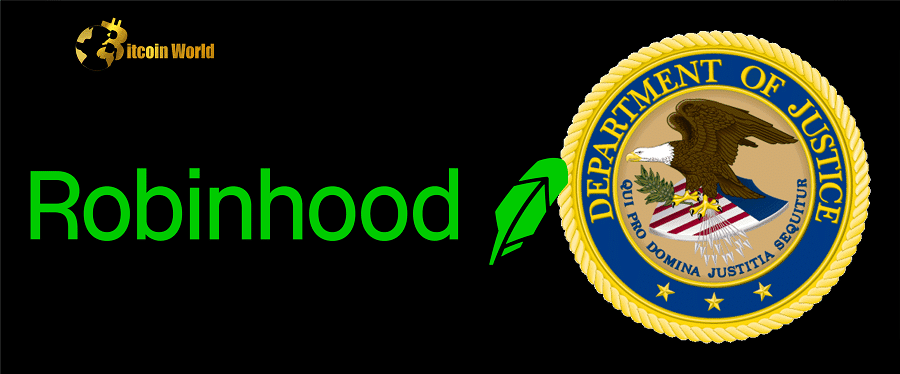The saga surrounding the collapse of cryptocurrency exchange FTX takes another dramatic turn. Despite vehement objections from his legal team, the long arm of the law, specifically the US Department of Justice (DOJ), has officially seized a significant chunk of Robinhood shares tied to the disgraced FTX founder, Sam Bankman-Fried (SBF). Let’s break down what this means and why it’s making headlines.
The DOJ’s Move: A Deep Dive into the Seizure
In a filing dated January 6th, the DOJ’s Civil Division’s Commercial Litigation branch informed the bankruptcy court in New Jersey that over $456 million worth of Robinhood shares, directly connected to the former crypto mogul, are now firmly in the US government’s possession. The specifics are quite telling:
- Quantity of Shares: A staggering 55,273,469 shares of Robinhood Markets Inc. stock.
- Cash Grab: An additional $20,746,713.67 in US currency.
- Location of Assets: These assets were held in an account at ED&F Man Capital Markets Inc.
- Legal Basis: The seizure was authorized by judicially issued warrants in the Southern District of New York.
The DOJ isn’t mincing words about the nature of these assets. According to the filing, they are considered “property involved in money laundering and wire fraud criminal statute violations” and are explicitly stated as “not property of the bankruptcy estate.” This distinction is crucial and we’ll delve into why shortly.
Why This Matters: Unpacking the FTX Fallout
To understand the significance of this seizure, we need to rewind a bit. FTX, once a leading cryptocurrency exchange, filed for bankruptcy in November after a cascade of customer withdrawal requests it couldn’t fulfill. This triggered a domino effect, exposing a potential multi-billion dollar hole in the exchange’s finances and landing its founder, Sam Bankman-Fried, in hot water.
SBF currently faces an eight-count indictment, accused of misappropriating billions of dollars belonging to FTX customers. The DOJ’s seizure of these Robinhood shares adds another layer to the already complex legal proceedings.
The Robinhood Connection: How Did SBF Get These Shares?
Here’s where things get a bit more intricate. Bankman-Fried claims that he and FTX’s chief technology officer, Gary Wang, used funds borrowed from Alameda Research, FTX’s sister trading firm, to finance the purchase of these Robinhood shares. This investment was made through a shell company named Emergent Fidelity Technologies, with Bankman-Fried reportedly owning 90% of it.
Let’s visualize this relationship:
| Entity | Role |
|---|---|
| Sam Bankman-Fried (SBF) | Founder of FTX, majority owner of Emergent Fidelity Technologies |
| FTX | Cryptocurrency exchange that filed for bankruptcy |
| Alameda Research | FTX’s sister trading firm, allegedly lent funds for the Robinhood share purchase |
| Emergent Fidelity Technologies | Shell company used to purchase the Robinhood shares |
| Robinhood | Popular trading app whose shares were seized |
The Legal Battle: Who Gets the Shares?
This is where the conflict lies. Bankman-Fried’s legal team argues vehemently that Emergent Fidelity Technologies is a separate entity and should not be dragged into FTX’s bankruptcy proceedings. Their argument hinges on the idea that Emergent’s assets, including the Robinhood shares, are not part of the pool of funds available to repay FTX’s creditors.
Furthermore, SBF’s lawyers claim he needs these funds to finance his own legal defense – a potentially costly endeavor given the gravity of the charges he faces.
Why the DOJ’s Seizure is a Game Changer
The DOJ’s action significantly complicates things for Bankman-Fried. By seizing the assets under the premise of money laundering and wire fraud, the government is asserting its claim to these funds, potentially ahead of both FTX’s creditors and SBF’s personal needs. This move suggests the DOJ believes these assets are directly tied to alleged criminal activity.
What are the Potential Outcomes?
- For FTX Creditors: The DOJ’s seizure, if successful, means these specific assets won’t be available to repay FTX customers who lost their funds. However, it also signals the government’s commitment to pursuing assets linked to potential fraud.
- For Sam Bankman-Fried: Losing access to these funds significantly hampers his ability to mount a robust legal defense. It also weakens his argument that these assets are separate from the FTX bankruptcy.
- For Robinhood: The direct impact on Robinhood is likely minimal. The seizure involves ownership of their shares, not the company’s operations or financial stability.
Looking Ahead: What Happens Now?
The legal battle over these Robinhood shares is likely far from over. We can expect further filings, arguments, and potentially court rulings to determine the ultimate fate of these assets. This case highlights the increasing scrutiny and regulatory attention being directed towards the cryptocurrency industry, particularly in the wake of high-profile collapses like FTX.
Key Takeaways:
- The DOJ has seized over $456 million in Robinhood shares linked to Sam Bankman-Fried.
- The seizure is based on allegations of money laundering and wire fraud.
- Bankman-Fried argues the shares are owned by a separate entity and needed for his legal defense.
- This legal tussle underscores the complexities of asset recovery in cryptocurrency-related bankruptcies.
- The outcome will have implications for FTX creditors and SBF’s legal strategy.
Conclusion: A Tangled Web of Crypto and the Law
The seizure of Robinhood shares is a significant development in the ongoing FTX saga. It underscores the serious legal challenges facing Sam Bankman-Fried and highlights the government’s determination to pursue assets linked to alleged wrongdoing in the cryptocurrency space. As the legal proceedings unfold, the fate of these shares, and the wider implications for the crypto industry, remain a key area to watch. This case serves as a stark reminder of the risks involved in the digital asset world and the increasing importance of regulatory oversight.
Disclaimer: The information provided is not trading advice, Bitcoinworld.co.in holds no liability for any investments made based on the information provided on this page. We strongly recommend independent research and/or consultation with a qualified professional before making any investment decisions.




